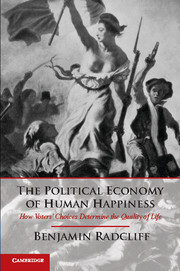Book contents
- Frontmatter
- Contents
- Acknowledgments
- Introduction
- 1 The Democratic Pursuit of Happiness
- 2 Market Democracy
- 3 Citizens or Market Participants?
- 4 The Scientific Study of Happiness
- 5 The Size of the State
- 6 Labor Unions and Economic Regulation
- 7 The American States
- 8 Between Market and Morality
- References
- Index
5 - The Size of the State
Published online by Cambridge University Press: 05 March 2013
- Frontmatter
- Contents
- Acknowledgments
- Introduction
- 1 The Democratic Pursuit of Happiness
- 2 Market Democracy
- 3 Citizens or Market Participants?
- 4 The Scientific Study of Happiness
- 5 The Size of the State
- 6 Labor Unions and Economic Regulation
- 7 The American States
- 8 Between Market and Morality
- References
- Index
Summary
For too many of us life was no longer free; liberty no longer real; men could no longer follow the pursuit of happiness. Against economic tyranny such as this, the American citizen could appeal only to the organized power of government.
– Franklin Delano Roosevelt (1936)Government is not the solution to our problem; government is the problem.
– Ronald Reagan (1981)In this chapter, we commence our empirical analysis of the political determinants of happiness, beginning with the most obvious and significant question in the traditional debate between Left and Right: Does “big government” improve or impoverish human life? Given the metric of life satisfaction adopted here for assessing quality of life, this seemingly imponderably complex philosophical question reduces itself to a relatively simple empirical question that is within our means to answer: Does a large, activist state tend to make people more or less satisfied with their lives? To use the formula frequently evoked in the United States over this question, is government the solution or the problem?
The size of government, in turn, can be conceived of as having three aspects. The first is the scope of the welfare state, which directly transfers income from its a priori market distribution to a politically determined distribution. The welfare state dispenses unemployment and sickness benefits, family allowances, pensions, and other kinds of income maintenance to those in need. By decommodifying persons in this way, it fundamentally alters, as we have seen, the basic relationship between workers and employers, with what both defenders and detractors agree are profound consequences for individual and society. It remains for us to determine whether, and how, the changes affected by the welfare state influence human happiness.
- Type
- Chapter
- Information
- The Political Economy of Human HappinessHow Voters' Choices Determine the Quality of Life, pp. 110 - 141Publisher: Cambridge University PressPrint publication year: 2013



